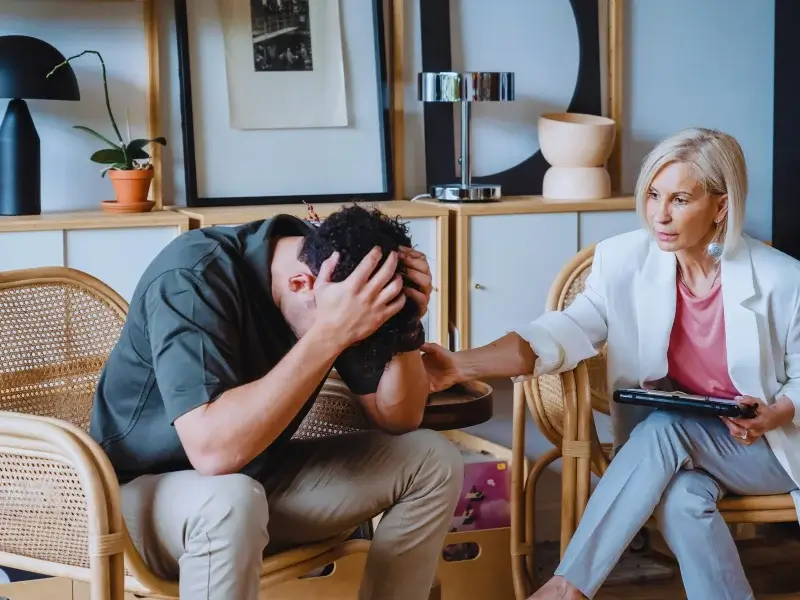
Anxiety in crowded places or within the dynamics of relationships is a common challenge many individuals face.
For some, navigating crowds of people or interpersonal relations can trigger overwhelming stress or unease.
This blog will explore strategies for managing anxiety in these situations, drawing from psychology and therapeutic insights.
What Is Social Anxiety?
Social anxiety triggers overwhelming stress when navigating through or even thinking about being in large groups of people.
Those experiencing this may avoid events, public transportation, or crowded places like malls, feeling trapped or suffocated.
According to the Anxiety & Depression Association of America, understanding the roots and symptoms of anxiety is paramount to managing its impact on your life.
Possible Causes of Social Anxiety
Genetic and Biological Factors
Just like many other mental health disorders, social anxiety can have genetic roots.
If a close family member, such as a parent or sibling, has social anxiety, the chances of developing the disorder can be higher.
Additionally, research suggests that variations in the brain’s serotonin levels, often associated with mood and social behavior, might contribute to social anxiety.
Environment and Upbringing
A person’s environment and upbringing can significantly influence the development of social anxiety.
Experiences like bullying, ridicule, rejection, humiliation, or family conflict can make a person more prone to social anxiety later in life.
In some families, children might be taught or expected to behave in a particular manner in social situations, and any deviation might lead to criticism or embarrassment.
This pressure can lead to social anxiety over time as the child becomes overly concerned about the reactions of others.
Previous Traumatic Experiences
Specific traumatic events or experiences can trigger social anxiety.
These could include public speaking, social faux pas, or embarrassing public events.
Such experiences may result in heightened fear and anxiety about similar situations in the future.
Personality and Temperament
Individuals characterized by shyness or behavioral inhibition in childhood often exhibit signs of social anxiety in their teenage years and adulthood.
Having a reserved or introverted temperament may predispose a person to social anxiety.
Cultural Factors
Cultural context can play a significant role as well.
Some cultures place great significance on social behavior, politeness, and conformity.
In societies that stigmatize or severely penalize any deviation from accepted social norms, individuals are more likely to develop social anxiety.

Symptoms of Social Anxiety
Physical Symptoms
These are some of the physical signs that might indicate a person is dealing with social anxiety:
- Blushing, Sweating, and Trembling: These are some of the most common physical symptoms and are often associated with feeling “on the spot” or embarrassed.
- Rapid Heart Rate: Individuals with social anxiety often exhibit a fast, pounding heartbeat during social encounters.
- Upset Stomach or Nausea: Stress and anxiety can trigger psychosomatic responses, manifesting as an upset stomach or feelings of nausea.
- Difficulty Speaking: This might include a shaky voice, a dry throat, or stuttering.
Emotional and Behavioral Symptoms
- Intense Fear: Individuals may experience extreme fear of certain social situations, especially unfamiliar ones or those wherein they feel they’ll be watched or evaluated by others.
- High Self-Consciousness and Fear of Embarrassment: This typically involves a fear of appearing awkward, humiliated, or visibly anxious.
- Avoidance of Social Situations: To circumvent the anxiety, individuals may outright avoid social encounters. This avoidance might be so severe that it limits one’s life, affecting personal relationships, work, or school.
- Difficulty Forming and Maintaining Relationships: The fear and avoidance of social situations can lead to difficulties in making and keeping friends or maintaining professional relationships.
Cognitive Symptoms
- Negative Expectations and Self-Talk: Individuals with social anxiety often hold negative beliefs about social situations and engage in negative self-talk before, during, and after such gatherings.
- Overemphasis on Past Mistakes: One may repeatedly analyze past social encounters and dwell excessively on perceived blunders or awkwardness.
- Preoccupation with Symptoms: Worrying about physical symptoms of social anxiety, such as blushing or trembling, and believing that others negatively judge these symptoms can form a vicious cycle, heightening the anxiety.

Strategies to Cope with Social Anxiety
Gradual Exposure
One of the most effective tactics for managing social anxiety is gradual exposure to socially anxious situations.
Starting small by engaging in brief interactions and progressively working towards more extended or challenging situations can help desensitize anxiety over time.
Thought Challenging
Many times, the anxiety felt in social situations is based on irrational and unfounded beliefs.
By challenging these thoughts, questioning their accuracy, and testing the reality of negative predictions, individuals can slowly shift their perspective to a more rational and calm state of mind.
Relaxation Techniques
Relaxation methods, such as deep breathing exercises, progressive muscle relaxation, and mindfulness meditation, can help individuals control the physical symptoms of anxiety.
Preparedness
Preparation can provide a sense of control when entering social situations.
This might include rehearsing conversations, having a set of questions ready to ask, or familiarizing oneself with the event’s details to reduce unpredictability.
Focus Shift
Shifting focus from oneself to one’s surroundings or others in a social situation can alleviate self-consciousness.
Engaging in active listening and showing genuine interest in others can help mitigate the feeling of being under the spotlight.
Assertiveness Training
Learning to communicate more effectively can increase confidence in social situations.
Assertiveness training helps individuals express their thoughts and feelings confidently and constructively without resorting to passive or aggressive behaviors.
Cognitive-Behavioral Therapy (CBT)
CBT is a highly effective treatment for social anxiety.
It involves working with a therapist to identify and change negative thought patterns and behaviors, providing long-lasting skills to manage symptoms.
Self-Care
Maintaining a healthy lifestyle, including regular physical activity, adequate sleep, and a balanced diet, can have a significant positive impact on anxiety levels.
Reducing caffeine and alcohol intake, which can exacerbate anxiety, is particularly important.
Support Groups
Joining a support group for people with social anxiety can provide not only strategies for managing symptoms but also a sense of community.
Understanding that one is not alone in one’s struggles can be incredibly empowering.
When to Seek Help?
When self-help and coping strategies aren’t enough, seeking help from a mental health professional is wise.
Therapies like CBT, medication like selective serotonin reuptake inhibitors (SSRIs), or a combination of both have proven to be effective in treating social anxiety disorder.
It’s important to remember that having social anxiety does not mean weakness or failure.
It’s a legitimate, pervasive, and, at times, debilitating condition–but one that can be managed and overcome with the right support and strategies.
Final Thoughts
Managing social anxiety is a journey that requires patience, practice, and persistence.
Individuals can reclaim their freedom from fear and engage more confidently in the world around them by understanding the disorder’s nature and employing various coping strategies,
Remember, it’s important to celebrate small victories along the way.
Each step, no matter how small it seems, is progress toward a life less encumbered by anxiety.
Take the time to reflect on growth, seek support when needed, and always move forward at a pace that feels right for you.
With dedication and the right strategies, social anxiety can be managed, and a fulfilling social life can be within reach.
If you’re struggling with social anxiety and searching for effective strategies to regain control and improve your quality of life, the CNS Center of Arizona is here to support you.
Our team specializes in a comprehensive range of services tailored to address not just social anxiety but a broad spectrum of psychiatric disorders.
Don’t let social anxiety dictate your life. Schedule a call with us today.
Let’s work together to tailor a treatment plan that aligns with your unique needs, leveraging our expertise and the latest evidence-based practices.





